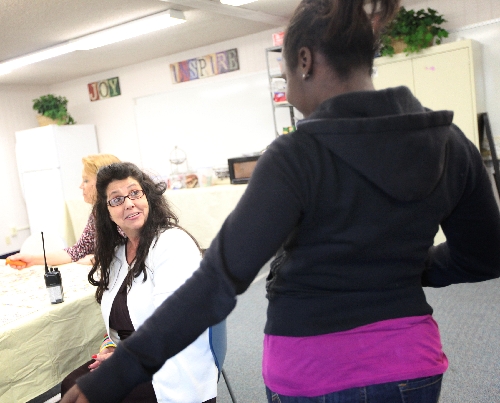Rancho High registrar aids homeless teens, families
Angela Urquiaga is on the phone, trying to track down one of her babies.
That's what she calls the roughly 150 Rancho High School students who don't have a permanent place to live.
"He's not still in your shelter?" she says to someone on the other end of the line. "He hasn't been in school."
By the time she hangs up, she's nearly in tears.
"I'm really worried that he's out on the streets," she says.
This is what Urquiaga -- Miss Angela to the kids -- does all day: keeps track of Rancho's neediest students, making sure they have food, shelter, bus passes and other necessities so they can graduate.
Her job as the school's homeless advocate -- she's also the registrar -- has been getting bigger and bigger.
A few years ago, fewer than a dozen students at the school needed her help. Then the economy tanked. Parents already struggling in the neighborhood just east of Las Vegas's homeless corridor were hit hard. Some doubled up with extended family or friends. Others told their teenagers they would have to fend for themselves. A few simply abandoned their kids, Urquiaga says: "They couldn't take care of them."
Urquiaga now believes Rancho has the most homeless high school students in the valley.
Her office includes a storage closet full of clothes, school supplies, snacks and hygiene products -- mostly donations from friends and businesses. Students stop by to pick up what they need.
Urquiaga calls them "mijo" or "mija" -- terms of endearment short for "my son" and "my daughter" in Spanish. Her Cuban accent still is noticeable more than four decades after she immigrated to the United States with her grandmother.
Now 59, Urquiaga came to Nevada at 12 years old. She became a naturalized U.S. citizen so long ago she can't remember exactly when.
She can relate to what some of her Rancho kids go through. When she and her grandmother arrived, they had almost nothing. Later, Urquiaga left an abusive marriage and raised four children on her own.
"Sometimes, they ate only bread and butter."
When a student comes to her, saying they have no place to stay, Urquiaga gets on the phone with local youth shelters and churches. If they can't help, she calls friends. "I say, 'Do you have a garage or something?' "
Sometimes she coordinates housing for the entire family.
Last year, Urquiaga got a call from an 18-year-old Green Valley High School senior. His mother had died, and he was living in his car. She couldn't find a place for him. So, she brought him home.
The young man lived in her guest room for months.
"I enrolled him here" at Rancho, Urquiaga says, laughing. "I helped him get a football scholarship" to a school out of state. That's where he is now.
Sometimes it's a scramble to keep the shelves stocked with supplies for students who need them. People aren't as willing to donate to homeless teens -- some of whom are legally adults -- as they are to younger children.
"God bless them, but they forget about the high school kids," Urquiaga says. "We need a lot of help from the community. I'm just one little-bitty old lady."
Some of those who have helped say teen homelessness is a problem that doesn't get the attention it deserves.
"We don't have a 5-year-old little girl as a poster child. It's not as sympathetic a situation," says Don Purdue, a project manager for Harmony Homes.
With backing from Harmony, Purdue and a friend recently started a nonprofit dedicated to helping homeless high school students. The organization is called Project 150 after the 150 homeless students at Rancho.
Purdue learned about the problem at Rancho late last year from a posting on Facebook.
"I couldn't believe it," he says. "I thought, 'That's impossible.' " He scheduled a meeting with Urquiaga, at her office.
"In about half an hour, three kids walked in with problems," he says. "One needed a cap and gown to graduation. There was a girl she (Urquiaga) had helped find an apartment with her dad. It was incredibly moving and sobering."
The organization now has a website: project150lv.org.
As part of the Clark County School District's Title I HOPE program, a portable trailer at Rancho was turned into A Place Called Hope last year for students who may not have a stable residence. They drop by after school for snacks, a chat with teachers or to use a computer. The walls are decorated with artwork including a poster listing "50 things to do to prevent a pregnancy!"
A 17-year-old girl is hanging out in the portable Tuesday afternoon, microwaving some lasagna and talking with Urquiaga and two Rancho teachers.
The girl, her mother and little sister just moved into an inexpensive apartment after living in a homeless shelter. At Christmas, Urquiaga made sure the girl received gifts -- a bathrobe, CD player and gift cards to Smith's. Urquiaga also helped the girl get a part-time job selling newspapers.
When asked about her plans after graduation, the girl says she is going to college. "I didn't spend 11 years in school for nothin'."
Someday she wants to be a housekeeper "for one of those hotels. They make a lot of money."
The teachers tell her that if she goes to college, she could some day manage one of those hotels.
"Or maybe be a nurse," she says.
At the end of the day, Urquiaga still hasn't found the missing boy she was trying to track down.
She'll keep looking.
Contact reporter Lynnette Curtis at lcurtis@review journal.com.






















